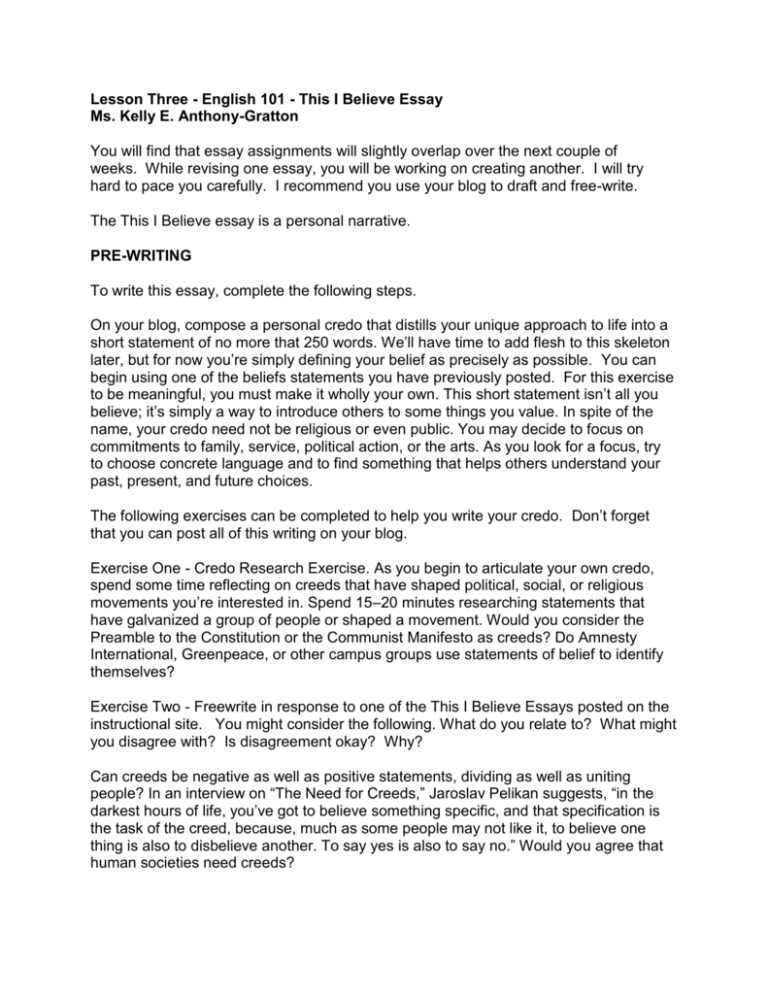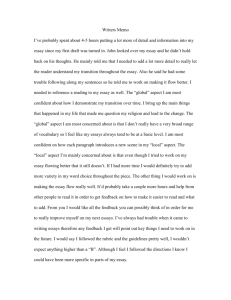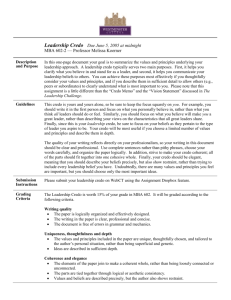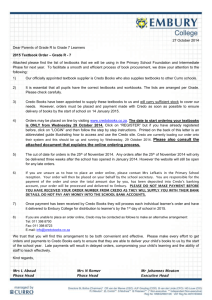This I Believe Essay Assignment - English 101
advertisement

Lesson Three - English 101 - This I Believe Essay Ms. Kelly E. Anthony-Gratton You will find that essay assignments will slightly overlap over the next couple of weeks. While revising one essay, you will be working on creating another. I will try hard to pace you carefully. I recommend you use your blog to draft and free-write. The This I Believe essay is a personal narrative. PRE-WRITING To write this essay, complete the following steps. On your blog, compose a personal credo that distills your unique approach to life into a short statement of no more that 250 words. We’ll have time to add flesh to this skeleton later, but for now you’re simply defining your belief as precisely as possible. You can begin using one of the beliefs statements you have previously posted. For this exercise to be meaningful, you must make it wholly your own. This short statement isn’t all you believe; it’s simply a way to introduce others to some things you value. In spite of the name, your credo need not be religious or even public. You may decide to focus on commitments to family, service, political action, or the arts. As you look for a focus, try to choose concrete language and to find something that helps others understand your past, present, and future choices. The following exercises can be completed to help you write your credo. Don’t forget that you can post all of this writing on your blog. Exercise One - Credo Research Exercise. As you begin to articulate your own credo, spend some time reflecting on creeds that have shaped political, social, or religious movements you’re interested in. Spend 15–20 minutes researching statements that have galvanized a group of people or shaped a movement. Would you consider the Preamble to the Constitution or the Communist Manifesto as creeds? Do Amnesty International, Greenpeace, or other campus groups use statements of belief to identify themselves? Exercise Two - Freewrite in response to one of the This I Believe Essays posted on the instructional site. You might consider the following. What do you relate to? What might you disagree with? Is disagreement okay? Why? Can creeds be negative as well as positive statements, dividing as well as uniting people? In an interview on “The Need for Creeds,” Jaroslav Pelikan suggests, “in the darkest hours of life, you’ve got to believe something specific, and that specification is the task of the creed, because, much as some people may not like it, to believe one thing is also to disbelieve another. To say yes is also to say no.” Would you agree that human societies need creeds? ESSAY (Work on this after you have posted your Credo to your blog) After composing your credo, begin to think about the stories and the moments in time, or experiences, that brought you to this place of thinking. Write an essay that states your belief clearly and concisely. For thousands of years communities of faith have identified themselves with short, carefully worded statements of belief, or creeds. Even today, when someone claims to follow a set of beliefs or principles, we often identify these as a credo, literally Latin for “I believe.” In the history of religion, creeds have both united and divided believers through statements that sometimes differed only by a few words. Muslims have gathered daily to confess, “There is no God but God and Muhammad is his prophet” even as Jews have repeated, “Hear, O Israel: The Lord our God is one Lord.” The Christian creeds followed, teaching the mystery of “ one God” in three persons before Protestant reformers questioned all human creeds, turning to “scripture alone” as the last word. But, creeds flow and ebb through our daily lives and are not based solely on religious beliefs, but often on the beliefs, or core values we choose to live by In the 1950s, journalist Edward R. Murrow hosted a weekly radio series inviting listeners “to write about the core beliefs that guide your daily life.” At a time of political and cultural anxiety, the show asked Nobel laureates and everyday citizens to articulate their personal articles of faith even as it called them to listen carefully to the beliefs of others. In 2005 This I Believe was revived for NPR as a way “to encourage people to begin the . . . difficult task of developing respect for beliefs different from their own.” Tens of thousands of Americans have written in to join Colin Powell, Gloria Steinem, and Tony Hawk in returning the dialogue of beliefs to American broadcasting. Your final essay should attempt to add your voice to this discussion. For this essay you will write a 3–4 page personal essay, in MLA format describing an idea or principle you believe in. Read carefully. This is not an essay about religion, but an essay about an idea, core belief, value or principle. The readings required for this week are excellent examples of these types of essays. You have two weeks to pre-write, compose, and revise this essay. NOTE – Examples of This I Believe essays are posted on Ms. A.’s Classroom under the eAnthology tab.










